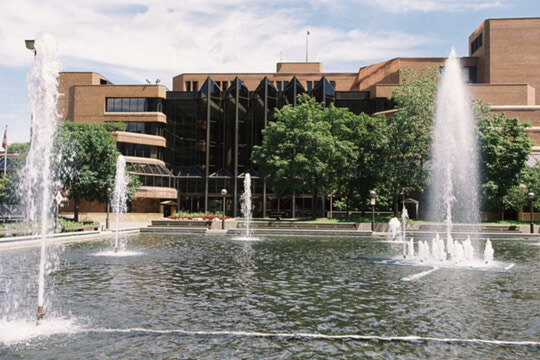
Andrée Laforest, Minister of Municipal Affairs, described the newly unveiled 2025–2029 Outaouais Action Plan as a coordinated government strategy to address regional priorities such as housing, education, economic diversification, and climate resilience, with the goal of strengthening the vitality and sustainability of the territory. Photo: Tashi Farmilo
Quebec launches Regional Action Plan to revitalize the Outaouais
Tashi Farmilo
The Quebec government has unveiled a comprehensive action plan to support the long-term development of the Outaouais region. The Plan d’action régional 2025–2029, presented on March 24 by Minister Mathieu Lacombe, is part of the province’s broader strategy to ensure territorial vitality and directly addresses priorities identified by municipal leaders.
“The territory has its own specificities, its own colors and riches,” said Lacombe. “It is therefore essential to showcase them and ensure that they have positive impacts for the entire population.”
At the heart of the plan are seven regional priorities, including affordable housing, cultural development, improved access to education, sustainable local services, food security, economic diversification, and climate adaptation. Each is supported by measurable goals and concrete government commitments.
Housing remains one of the most pressing issues. Rising costs and low vacancy rates have made it increasingly difficult for residents to find affordable options. The plan calls for building new units, diversifying rental offerings, and exploring public land transfers to support social housing.
On the cultural front, the government will increase support for arts and heritage initiatives to offset the region’s proximity to Ottawa and Montreal, which often draw away talent and resources. New funding and promotional efforts will target underserved areas outside Gatineau.
Educational inequality is also a key concern. While urban centers enjoy higher rates of post-secondary education, rural municipalities face elevated dropout rates. The plan aims to expand local training options, especially in sectors facing labor shortages.
Environmental and climate resilience are central to the strategy. Measures include reducing emissions through transit electrification, supporting biodiversity, and protecting natural areas. In tandem, the plan promotes food security through local farming initiatives and support for agro-environmental practices.
The rollout will be led by the Conférence administrative régionale de l’Outaouais (CAR), a first for the region. This interministerial body will coordinate efforts across sectors and ensure regional voices shape implementation.
Andrée Laforest, Minister of Municipal Affairs, called the plan “a real lever” for regional vitality. “The commitment and mobilization of all partners are essential,” she said. “Promising projects will emerge in the coming years and will have positive impacts for all local communities.”
Lacombe echoed that momentum: “Thanks to this action plan, we can continue to act concretely for today’s and tomorrow’s generations.”





